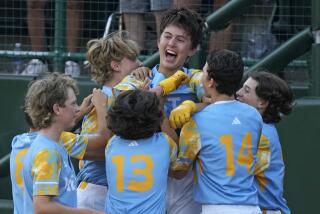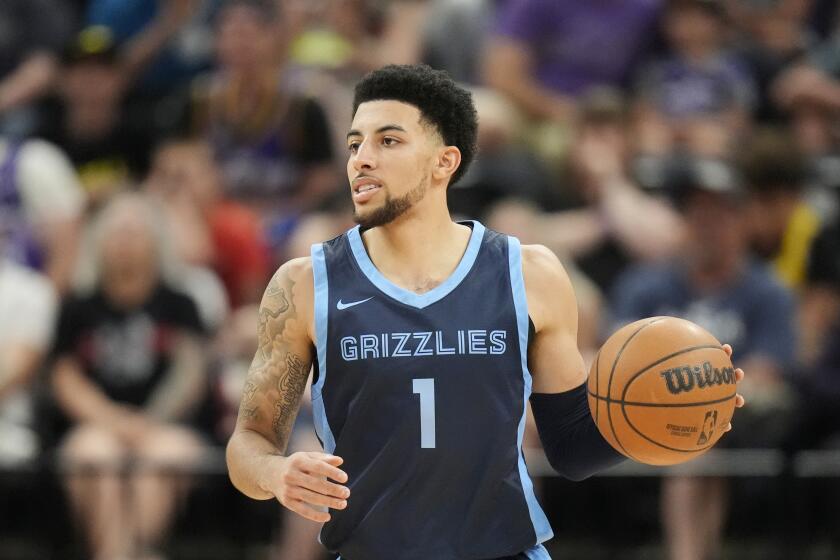COLLEGE BASKETBALL 1995-96 : Women Have Two New Incentives This Season : National outlook: Television contract and the prospect of a professional league should inspire players.
The 1995-96 women’s college basketball season has opened with two thoughts uppermost in the players’ minds:
--Cable television.
--The prospect of a new professional league.
The women’s game finally got the television deal it has been chasing for years. This season, 64 games will be shown on ESPN and ESPN2, giving the sport substantially more exposure than ever before.
And, for the first time in more than a dozen years, the game’s elite players may be able to look forward to playing professionally at home, instead of in Europe, Japan or South America.
The American Basketball League, which has already signed the entire U.S. Olympic team, is putting franchises in 12 cities--none in Southern California--for an inaugural season in 1996-97.
League founders say they plan to pay their best players about $125,000 a year, with an average of $70,000. It’s the first serious U.S. attempt at a pro league since the Women’s Professional Basketball League, which lasted from 1979 through the spring of ’82.
But first things first, the debut season of the seven-year, $19-million ESPN deal.
The national picture projects little change in the women’s power structure. In this week’s Associated Press poll, teams rated first through fifth were all in the Final Four in the last three seasons, and five others--among them three recent national champions--were ranked from eighth to 24th.
Defending champion Connecticut, picked first in many preseason polls, is given a good chance to be the first to repeat since the Cheryl Miller-led USC teams of the early 1980s. The Huskies lost player-of-the-year Rebecca Lobo but still have 6-foot-7 Kara Wolters inside and 5-7 Jennifer Rizzotti outside.
But Connecticut, 35-0 last year and ranked first in the preseason poll, didn’t make it unbeaten through the season’s first week.
Breaking fastest from the gate was traditional power Louisiana Tech. Denied an eighth Final Four trip last year by Tennessee, Louisiana Tech beat UConn last week at Knoxville, 83-81 in overtime.
For Coach Leon Barmore, the best part of the victory was the 16-point effort by his 6-feet-4 post player, Racquel Spurlock, a once-reluctant shooter.
“If we can get that kind of production out of her, 15, 16 points a game, we’re going to be very good,” Barmore said.
Georgia, with all five starters back from last season’s Final Four team, should be a top-10 team all season, as will Tennessee, beaten by UConn in last year’s championship game at Minneapolis.
Pat Summitt’s Volunteers lost two All-Americans, Nikki McCray and Dana Johnson, but the beat never stops in Knoxville. Already a sensation is Summitt’s top recruit, New York City prep Chamique Holdsclaw, probably the country’s most recruited high school girl last year.
Colorado lost one of the country’s best point guards, Shelley Sheetz and 6-5 center Isabelle Fijalkowski. But many still pick the Buffaloes to reach Charlotte. The same is true of Arkansas, where third-year Coach Gary Blair is blending a strong recruiting class with holdovers from last year’s 23-7 team.
Two big-name women’s coaches have changed their address.
Theresa Grentz, 19 years at Rutgers and the 1992 U.S. Olympic coach, moved to Big Ten weakling Illinois. Then, in a surprise, Vivian Stringer, after 12 years at Iowa, took the Rutgers job for the biggest deal ever for a woman’s coach, a package worth $300,000 a year.
There’s a short-term change at Stanford, where Tara VanDerveer took a year’s leave to coach the 1996 Olympic team. Filling in are assistants Amy Tucker and Marianne Stanley.
The Final Four on March 29 and 31--the event was sold out last year--will be played at the 22,949-seat Charlotte Coliseum. Regional tournaments are March 23-25, at Chicago; Nacogdoches, Texas; Charlottesville, Va.; and Seattle.
Note the day off at the Final Four, a first. Under the old TV contract, CBS compelled the women to play their title game the day after the semifinals.
More to Read
Go beyond the scoreboard
Get the latest on L.A.'s teams in the daily Sports Report newsletter.
You may occasionally receive promotional content from the Los Angeles Times.






